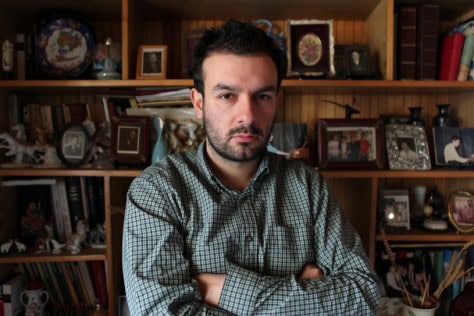Il était une fois—or, as we say in English, once upon a time—you could smoke cigarettes in the cafes and bars of Paris. The first time I met Lou Doillon was in one of these now-mythological cafes near the Bastille late last year. We met for the purpose of discussing a movie I had written and was planning to direct called The Bright Side. The film, in brief, concerns the difficult relationship between a reclusive, alcoholic ex-pat American writer living just outside Paris and his possibly schizophrenic, half-French/half-American daughter. The daughter has spent the last twelve years in a mental institution in England, and I needed an actress who could speak fluent French and fluent, British-accented English. There are approximately two such women, and both of them are, in France, extremely famous. One of them is Lou Doillon. The other is her older sister Charlotte Gainsbourg. Because the character in question is 25 years old in the film, and because Doillon is 25 in real life, I gave her the script to read. Then that meeting, which lasted four hours and sixty cigarettes.
I had been warned before our first meeting that Doillon had a somewhat troubled reputation, or a reputation for trouble, or something. I wasn’t exactly sure; it had to do with partying and drugs and being rebellious and generally behaving badly. Until recently, anyway. When I arrived in Paris last autumn, the most recent issue of French Elle magazine featured the actress on the cover with the tagline “The New Lou Doillon,” who was presumably better than the old Lou Doillon. Apparently she’d signed a deal with Lee Cooper, who has something very well known to do with fashion, to design a clothing line and had been touring around France giving very well-received solo theater performances, which consisted mainly of dramatic readings of intimate love letters by famous dead people, most of them French. In other words: Doillon could design clothes, and she could read and was therefore entirely reformed.
In any case, the Lou Doillon I met was incredibly sweet, charming, bright, funny and curious, a voracious and enthusiastic reader with a certain subtle, albeit detectable, insecurity and vulnerability. She has a maturity and a worldliness that belies her years—the result, no doubt, of growing up in public and of having had a son, Marlowe, when she was 19 (that was pre-reform era, evidently). But she was nothing at all like the troublemaker the media had led me to expect.
“I think it’s a mixture of what people fantasize and what I showed them,” Doillon says about the apparent dichotomy between the public perception of her and, well, her. “Because I started being in the press and on TV when I was 15, and I had dreadlocks, and I was very pissed off against society. I would walk around Paris barefooted. I was very much a bourgeois punk. Suddenly I saw rumors that I was completely mad, when I wasn’t. I was just politically rebellious, reading books and getting pissed off about things that the police were doing…and all of that. But not at all taking drugs, going out every night and having sex with a lot of people. I was extremely faithful, always staying at home and not going to the sort of parties where you would go mad. Sometimes I wish I was the Lou they talk about. When I was quite depressed, living in my house and Marlowe was 1 and I was 20, I opened a magazine where they said I was in the Hôtel Costes every night with various American actors, and I burst into tears, going, ‘God, I wish that was true!’”
Part of Doillon’s rebellious streak can be ascribed to an accident of birth; she was famous before she could talk. The daughter of screen/song/etceteras icon Jane Birkin and renowned French director Jacques Doillon, she was born into an extended family of half sisters and to an extremely famous and charismatic mother. (And let’s not forget her grandmother Judy Campbell, who died in 2004, a well-known English actress and occasional playwright, often described as Noël Coward’s muse.) All of them were older than Doillon, which meant she had to fight for attention.
“Problem number one is that we’re all girls,” she explains, “with a very strong, powerful, beautiful, overwhelming mother. And the same for a grandmother. I had my sister Kate [Barry], who’s fifteen years older than me, and she’d already left home when I was a little girl, and after that, Charlotte, who must have been at the time 12 or 13, who was already a big, big star in France as an actress and everyone knew and adored her. As a kid, my only way to get through to the table—literally, because my mother would make grand dinners with crazy people who were nearly all in love with her, or with one of my sisters, or with all my sisters and my mother, and I remember always sleeping under the table with the big bulldog—was to put on ridiculous costumes to make everyone laugh.
“And so I was Funny Lou because that’s the only thing I could do. I would put on Rollerblades and top hats and crazy dresses because all my family was very chic—just the jeans and the beautiful t-shirt and the Converse—and I would dress up in bright pink with Christmas decorations in my hair and try to fight my way through. That’s why I had tattoos when I was 12 and piercings. It was just anything to get them to turn their heads. But the older we get, the closer we’re all getting, and there’s a lovely relationship now.”
Compounding the early sibling problem was the father problem. Jacques Doillon, a very talented director but apparently a very difficult man, had the misfortune to follow close on the heels of France’s beloved son Serge Gainsbourg in the affections of Jane Birkin, with the result that, as Doillon says, “To this day, seventy-five percent of France thinks that I’m Serge’s daughter. People come up to me all the time and say, ‘Oh, I loved your father.’ And I say, ‘He’s not my father,’ and they always answer, ‘Nevermind.’ And for the first time, two weeks ago, I said to someone, ‘Well, I do mind.’ The person looked very confused, but I said, ‘You know, for the last twenty-five years, I’ve said I don’t mind, but I do mind.’ They think Doillon is a fake name.”
“And I loved Serge more than anything; he raised me like a second daughter. I used to call him Papa Deux, so he was a bit like a papa. But he did very funny, ruthless songs about my father, one of them called ‘Jake and I,’ where it said, ‘I’ll be happy when you’re dead. I’ll be dancing on your tomb.’ Once I got in a cab with my father, and the taxi driver says to me, ‘Oh, I love you. I love your mother and I love your father,’ so I’m smiling, and my father’s useless; he doesn’t say anything. And the guy put ‘Jake and I’ on full blast to please me because he thinks it’s my father singing. And in fact, it’s a song against my father, who’s in the cab with me, but by Serge, who I adore.”
All of which has led to what Doillon describes as “a very complicated and very beautiful relation with my father,” which is one of the chief reasons she was able to relate to the character she’ll be playing in The Bright Side. “When you have a father who’s strange and complicated and doesn’t have an easy time with life, you’ve got two solutions: to confront them in a very ruthless way or to make them your child, in a way, and to be very understanding. The father is very much like that in the script, and my father is very much like that. I was always obsessed by Antigone and Oedipus [from Sophocles’ Oedipus at Colonus], and the relation they have, where a daughter tries to save her father. And that’s an adventure that I could relate to in the script. Do we ever get over our father or mother? Aren’t we always seeking attention and trying to resolve something from childhood?”
For the purposes of The Bright Side and for the purposes of Lou Doillon, let’s agree that the answer to that question, like the answer to all good questions, is yes.
“In the end,” muses Doillon, “you have to think that all of this is love, even if sometimes the arrow of love is not pointed in the right direction. If you start seeing everything in a venomous way, I think you’ll go mad.”
Fashion Editor: John Tan
Hair: Amy Farid @ See Management
Makeup: Suzy Gerstein for MAC Cosmetics
 Q&A with Larry Gus
Q&A with Larry Gus We Own the Night: The Edison
We Own the Night: The Edison
No Comments